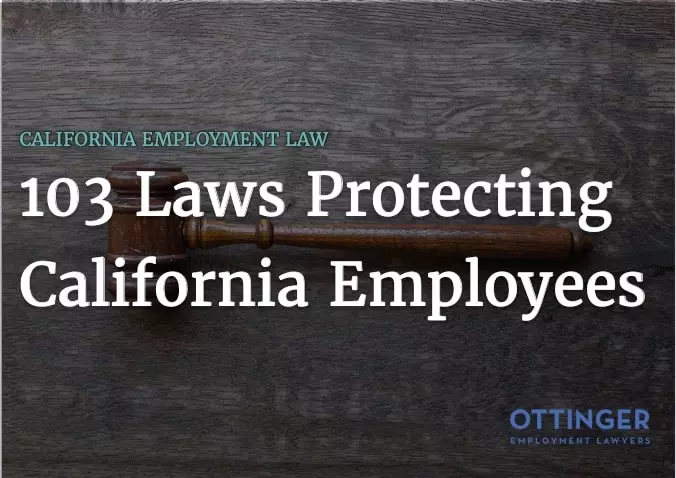103 Laws Protecting California Employees

If you want to find a comprehensive list of laws protecting California employees, then this post is the place for you!
Below you will find 103 laws that offer legal protection to employees working in California.
If you are looking for a specific type of employment law, you can click on the categories listed below to jump to that section.
If you want more info you can contact the experienced lawyers atOttinger Employment Lawyers today!
California Wage and Hour Laws

Minimum Wage and Overtime
- IWC Order MW-2019: As of January 1, 2020, employers with 26 or more employees must pay their California employees $13 per hour. Additionally, employers with 25 or fewer employees must pay their California employees $12 per hour.
- Cal. Labor Code Section 510: Non-exempt employees must receive overtime for eight or more hours worked in a single day. Also, employers owe overtime for more than 40 hours worked in a workweek. Employers must pay double time for hours worked in excess of 12 in a day or eight on the seventh day of any workweek.
- Cal. Labor Code Section 1194: Any employee who is receiving less than the legal minimum or overtime wage can file a lawsuit. This lawsuit can be for unpaid wages, interest, and attorney’s fees.
- San Francisco Administrative Code, Section 12R (For San Francisco Employees): Any employee who performs two or more hours of work in a week for an employer in San Francisco is entitled to San Francisco’s specified minimum wage. As of July 1, 2020, this minimum wage will be $16.07.
Meal and Rest Breaks
- Cal. Labor Code section 226.7: Non-exempt employees must receive rest breaks of at least 10 minutes for every four hours of work. If rest breaks are not provided, then an employer must pay the employee one hour of pay for each day that the rest break was not offered.
- Cal. Labor Code Section 512: Non-exempt employees that work more than six hours in a day must receive a meal period by the fifth hour. Additionally, this meal period must be at least 30 minutes long. Along with this, employers must offer additional meal periods for employees who work over 10 hours.
Record-keeping
- Cal. Labor Code Section 1198.5: Any current or former California employee, with limited exceptions, has the right to receive a copy of his or her personnel records.
- 29 CFR Section 516.2: All employers must maintain accurate payroll records for their employees. For instance, these records must contain the employee’s rate of pay, hours worked, overtime hours, and deductions.
- Cal. Labor Code Section 226: An employer must provide employees with accurate and itemized wage statements.
- Cal. Labor Code Section 353: An employer must keep accurate records of all tips received.
- Cal. Labor Code Section 1174: Employers must keep an employee’s payroll records on file for no less than three years. Along with other information, these records must include the ages of any minors who worked for the employer.
- Los Angeles Ordinance No. 184320, section 188.03(B) (For Los Angeles Employees): Employers within the city of Los Angeles must maintain payroll records for four years.
- Cal. Labor Code Section 432.3: Employers cannot ask prospective employees for salary history. Employers must also offer prospective employees with pay scale information upon request.
Wages
- Cal. Labor Code Section 2802: Employees are entitled to reimbursement of any necessary business-related expenses that they make. As a result, employers cannot pass operational costs onto their employees.
- Cal. Labor Code Section 201: Employers must pay wages immediately to an employee who is discharged.
- Cal. Labor Code Section 202: Employees who quit are owed wages within 72 hours after quitting. If the employee gave 72 hours’ notice of quitting, then the employer must pay the wages at the time that the employee quits.
- Cal. Labor Code Section 203: Employers must pay employees wages owed when their job ends. If they do not, the employee is entitled to payment for each day he or she is not paid owed wages. Additionally, this penalty continues for a maximum of 30 days, unless payment is submitted or legal actions commence.
- Cal. Labor Code Section 204: California employees, with some exceptions, must be paid at least twice a month. Also, employers must establish a regular payday for their employees.
- Cal. Labor Code Section 231: If an employer requires an employee to have a driver’s license for the job, then the employee must pay for any medical exams associated with obtaining that license. However, this does not apply to medical exams taken prior to the employee’s application.
- Cal. Labor Code Section 232(a): An employer cannot prevent an employee from disclosing the amount of his or her wages.
- Cal. Labor Code Section 351: Generally, an employer cannot withhold or take a portion of an employee’s tips.
- Cal. Labor Code Section 2800: An employer must compensate an employee for losses incurred due to the employer’s “want of ordinary care.” So, employers must take reasonable precautions to prevent an employee’s losses.
California Discrimination and Harassment Laws

General Protections
- Title VII of Civil Rights Act of 1964: This federal law makes it illegal for an employer to discriminate on the basis of race, color, national origin, sex, and/or religion.
- Cal. Gov. Code Section 12940(a): This law, also known as FEHA, offers protections from discrimination to certain classes of employees. Among these classes are race, religion, sexual orientation, physical or mental disability, gender identity, age, and veteran status.
- Cal. Gov. Code section 12940(j): An employer cannot harass an employee, applicant, or intern because the employee is a member of any of the protected classes in Section 12940(a).
- Cal. Gov. Code Section 12990: This law applies to workers contracted by the state for public work. These workers cannot be discriminated against for any of the protected classes listed in FEHA.
- Cal. Labor Code Section 1735: A contractor for public works projects cannot discriminate employment of people to work on public works on any basis listed in FEHA.
Hiring and Firing
- Cal. Labor Code Section 432.7(a): An employer cannot use any record of arrest or detention that did not result in a conviction for deciding whether to hire, promote, terminate, or train an employee. Likewise, the employer also cannot use any diversion programs or convictions that have been dismissed in its employment decisions.
- Cal. Labor Code Section 432.8: An applicant’s marijuana-related convictions that are more than two years old cannot be used by an employer in determining whether to hire, promote, terminate, or train him or her.
- Cal. Labor Code Section 1102: An employer cannot threaten to terminate its employees in an attempt to influence its employees toward a particular political action or activity.
- Cal. Labor Code 1024.5: Except for certain exceptions, employers cannot use a consumer credit report for employment purposes.
While Employed
- Cal. Labor Code Section 1101: An employer cannot require its employees to refrain from running for public office or from engaging in politics.
- Cal. Labor Code Section 970: An employer cannot knowingly make false statements to get an employee to relocate for work.
- Cal. Labor Code Section 1197.5: With some exceptions, an employer generally cannot pay two employees of opposite sex different rates of pay for substantially similar work performed under similar working conditions.
- Cal. Labor Code Section 1171: An individual participating in a national service organization cannot be discriminated against for refusing to work overtime for any legitimate reason.
- Cal. Labor Code Section 3095: An employer cannot discriminate in apprenticeship programs for public works.
California Retaliation and Whistleblowing Laws

Whistleblower
- Cal. Labor Code Section 1102.5: This law is commonly referred to as the California Whistleblower statute. It protects employees who disclose information they believe reveals a violation of a law or regulation. What is more, employers cannot retaliate against employees who disclose this information.
- Cal. Labor Code Section 98.6: Employers cannot retaliate against an employee for filing a complaint with the Labor Commissioner. Also, an employer cannot retaliate against an employee for exercising her rights under the IWC’s Labor Code of Orders and the Labor Code.
- Cal. Labor Code Section 232.5(c): Employers cannot retaliate against employees for disclosing information about working conditions.
- Gov. Code Section 8547 et seq.: State employees cannot be retaliated against for violations of law or threats to public safety.
- Cal. Labor Code Section 6310: Employers cannot retaliate against employees for reporting violations of Cal/OSHA’s health and safety rules.
- Cal. Labor Code Section 6399.7: This law protects employees who issue a complaint in connection with violations of the Hazardous Substances Information and Training Act.
- Cal. Gov. Code Section 12652: This law is also known as the California False Claims Act. It protects employees who report their employers for committing fraud or embezzlement against the government.
Retaliation against Victims
- Cal. Labor Code Section 230(c): An employer cannot retaliate against an employee who is a victim of sexual assault, domestic violence, or stalking for taking time off from work to get relief.
- Cal. Labor Code Section 230(e): An employer cannot retaliate against employees for telling the employer that they are the victim of domestic violence, sexual assault, or stalking.
- Cal. Labor Code Section 230.1: This law applies to employers with 25 or more employees. Such employers cannot retaliate against an employee who is a victim of sexual assault, domestic violence, or stalking for taking time off to seek medical attention or trauma services.
- Cal. Labor Code Section 230.2(b): An employer must allow an employee who is a victim of a crime to take time off work to attend a related judicial action. Also, this right extends to an immediate family member, domestic partner, or child of the victim.
- Cal. Labor Code Section 230.5: This law protects victims or family members to a victim of certain protected crimes, including sexual assault and domestic violence. Accordingly, employers cannot retaliate against these protected classes for taking time off work to participate in court proceedings.
Employment-based Retaliation
- Cal. Labor Code Section 96(k): Employers generally cannot retaliate against employees for working a second job. However, some exceptions include engaging in illegal activity and using trade secrets in a second job.
- Cal. Labor Code Section 230.3: Employers cannot retaliate against employees who are emergency response personnel for taking time off for their emergency response duties.
- Cal. Labor Code Section 230.4: Employers with 50 or more employees cannot retaliate against employees who are emergency response personnel for taking time off work to attend firefighting or law enforcement training.
Retaliation for Time Off
- Cal. Labor Code Section 230(a): An employer cannot retaliate against and employee for serving on a jury, as long as the employee gives the employer a reasonable notice.
- Cal. Labor Code Section 230(b): An employer cannot retaliate against an employee for taking time off to appear in court in a judicial proceeding.
- Cal. Labor Code Section 230.7: If a parent is legally required to be present at the child’s school, then he or she cannot be retaliated against by an employer for taking time off work to attend.
- Cal. Labor Code Section 230.8: An employee who is also a parent or guardian to a child can take up to 40 hours of time off work to participate in activities relating to the child’s school . Employers cannot retaliate against employees for taking this time off.
- Cal. Labor Code Section 246.5(c): An employer cannot retaliate against an employee for taking paid sick leave in accordance with Cal. Labor Code Section 245.
Other Retaliation
- Cal. Labor Code Section 244: An employer cannot report or threaten to report an employee’s immigration status to a government agency because the employee exercised his or her rights under the Labor Code. This protection also extends to any threats made by an employer concerning the employee’s family members.
- Cal. Labor Code Section 1311.5: Employers cannot retaliate against employees who filed a claim regarding a violation of the Labor Code that took place when the employee was a minor.
- Cal. Labor Code Section 921-923: An employer cannot interfere with an employee’s decision to join a union.
- Cal. Labor Code Section 232(c): Employers cannot retaliate against their employees for disclosing the amount of his or her wages.
- Cal. Labor Code Section 1019: An employer cannot threaten to make unfair immigration-related practices because an employee engaged in an activity protected by the Labor Code or local ordinances.
- Cal. Labor Code Section 1024.6: An employer cannot retaliate against an employee for making or attempting to make a lawful change of name, social security number, or federal employment authorization document.
- Cal. Labor Code Section 1030-1034: An employer cannot retaliate against employees for exercising their rights relating to expressing breast milk.
California Workplace Safety Laws

- Cal/OSHA: This collection of statutes offers extensive workplace safety benefits to California workers. Among these protections include the right to receive training for workplace hazards, the right to request an employer to correct a hazard, and the right to file a complaint with Cal/OSHA.
- Cal. Labor Code Section 230(f): If an employee discloses that he or she is a victim of sexual assault, violence, or stalking, then the employer must provide reasonable accommodations while the victim is at work. Specifically, these accommodations may include transfers, modifying schedules, or installing locks.
- Cal. Labor Code Section 232.5(a)-(b): Employers cannot prevent employees from disclosing information about the employer’s working conditions.
California Wrongful Termination Laws

- Cal. Labor Code Section 1198.3: An employer cannot terminate an employee for refusing to work hours in excess of those permitted by the IWC.
- Cal. Labor Code Section 1044: Employers cannot retaliate against employees who reveal an illiteracy problem but still perform satisfactory work.
- Cal. Labor Code Section 2929: Employers cannot discharge employees because they were threatened with garnishment of wages.
- Cal. Labor Code Section 6311: Employers cannot discharge employees for refusing to perform work that would violate any health and safety code.
California Medical Leave and Pregnancy Laws

Medical Leave
- Cal. Labor Code Section 245: Employees who work for 30 days or more in a year are entitled to paid sick leave. Furthermore, this leave can also be taken to care for a sick family member. At minimum, full-time employees must be given 24 hours of paid sick leave per year.
- Cal. Gov. Code Section 12945.2: This law is also known as the California Family Rights Act, or CFRA. Qualified employees who work for an employer with 50 or more employees in a 75-mile radius are entitled to up to 12 workweeks of unpaid leave for family care and medical leave.
- Labor Code Section 1512: Employers cannot retaliate against employees for taking a leave from work in order to donate an organ or bone marrow.
- Cal. Labor Code Section 6403.5(g): Employers cannot discipline health care workers for refusing to move a patient due to concerns over patient or worker safety.
- San Francisco Administrative Code, 12W: Unlike state paid sick leave law, the Paid Sick Leave Ordinance for San Francisco does not allow employers to cap the number of hours that an employee can take sick leave.
- Los Angeles Ordinance No. 184320, Section 187.04: This ordinance contains its own detailed protections for paid sick leave for employees who work in the city of Los Angeles.
Pregnancy and Childcare
- Cal. Gov. Code Section 12945: Employers with five or more employees must grant an employee disabled by pregnancy, childbirth, or other related medical condition a protected leave of absence from work.
- Cal. Labor Code Section 1030: Employers must offer employees who are desiring to express breast milk a reasonable amount of break time to do so.
- Cal. Gov. Code Section 12945.6: This law is also known as the New Parent Leave Act, or NPLA. It applies to qualified employees who work for an employer with 20 or more employees in a 75-mile radius. These employees are entitled to up to 12 weeks of job-protected leave if they are a new parent.
- Cal. Labor Code Section 1031: An employer must provide employees desiring to express breast milk with a private room to do so. Additionally, this room cannot be a bathroom, must be free from intrusion, and shielded from view.
- Health and Safety Code Section 1596.881: An employer cannot retaliate against an employee who reports violations of law pertaining to child day care facilities.
- San Francisco Police Code, Article 33I: Like the statewide Cal. Labor Code Section 1031, this law protects San Francisco employees who request accommodations for expressing breast milk.
California Disability and Accommodations Laws

- Americans with Disabilities Act (ADA): The ADA is a federal law that makes it illegal for employers to discriminate against employees because of a disability.
- Cal. Gov. Code Section 12940(m): This is a subsection of the Fair Employment and Housing Act (FEHA). An employer must give an employee a reasonable accommodation for any known physical or mental disabilities, as long as it does not create an “undue hardship”.
- Cal. Gov. Code Section 12940(n): When an employer knows of an employee’s disability, the employer must engage in an interactive process to make reasonable accommodations.
- Cal. Labor Code Section 1025: Private employers with 25 or more employees must reasonably accommodate an employee who decides to participate in a drug rehabilitation program.
- Cal. Labor Code Section 1041: Private employers with 25 or more employees must provide reasonable accommodations. Also, these employers must assist any employee who discloses an illiteracy problem in enrolling into an adult literacy program.
- Cal. Labor Code Section 1026: If an employee participates in a drug rehabilitation program, then the employee must safeguard the employee’s privacy with respect to that program.
- IWC Wage Order No. 7-2001: Employees have a right to suitable seats when the nature of the work calls for a seat.
California Bonus Compensation and Benefits Laws

- Cal. Labor Code Section 2806: No employer can discontinue medical, surgical, or hospital benefits or coverage for its employees without first providing written notice.
- Cal. Labor Code Section 2808(a): Employers must provide all eligible employees with an outline of the coverage of all company-sponsored health insurance.
- Cal. Labor Code Section 200: Earned bonuses fall under the category of “wages” under the Cal. Labor Code.
California Employment Agreements Laws

- Cal. Labor Code Section 232(b): An employer cannot require an employee to sign an agreement to waive the employee’s right to disclose the amount of his or her wages.
- Cal. Labor Code Section 232.5(b): Employers cannot require an employee to sign an agreement to waive the employee’s rights to disclose information about working conditions.
- Cal. Labor Code 2810: This law applies to contracts with a construction, farm labor, janitorial, security guard, or warehouse contractor. Accordingly, these contracts are void if a party knows that it does not include enough funds to allow the contractor to comply with federal, state, or local laws.
- Cal. Business and Professions Code, Section 16600: With few exceptions, restrictive covenants not to compete are void.
- Cal. Civil Code Section 1670.11: Any provision in a contract that waives a party’s right to testify regarding criminal or sexual misconduct in effect after January 1, 2019 is unenforceable.
- Cal. Gov. Code Section 12964.5: An employer cannot require employees to waive a right to make a claim against the employer. Additionally, the employer cannot require employees to waive their right to disclose unlawful acts in the workplace.
California Layoffs, Terminations, and Settlement Agreements

- Cal. Labor Code Section 1400-1408: This act is also known as the Cal-WARN Act. If a mass layoff falls within the provisions of this act, then employees must be given 60 days’ notice.
- Cal. Labor Code Section 2808(b): An employer must provide an employee upon termination with notification of healthcare coverage options.
- Cal. Civil Code Section 1668: A severance agreement cannot include a clause that would require an employee to break the law.
- Cal. Code of Civil Procedure, Section 1001: Any settlement agreement that contains a non-disclosure clause regarding workplace sexual harassment or discrimination is void.
- Cal. Civil Code Section 1542: A general release of claims provision in a contract does not extend to claims not known or suspected to exist by the releasing party.
Did we miss anything? Comment below and let us know what you think!




